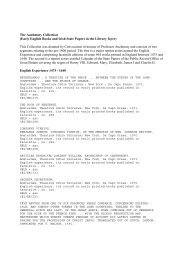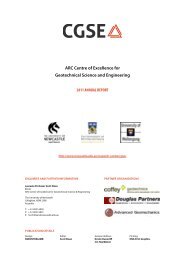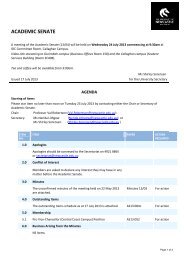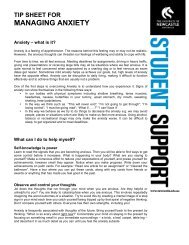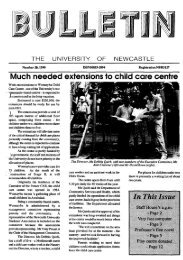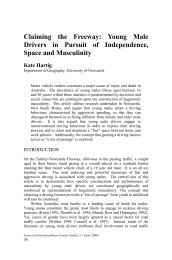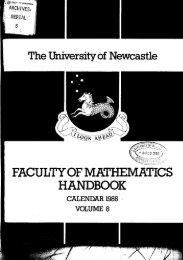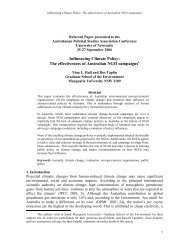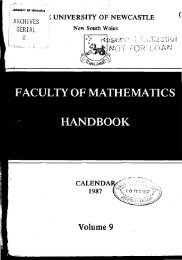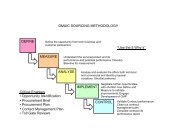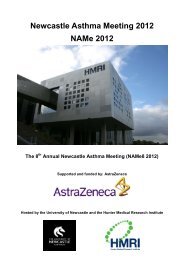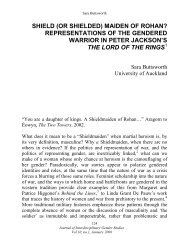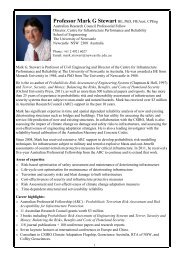n - University of Newcastle
n - University of Newcastle
n - University of Newcastle
You also want an ePaper? Increase the reach of your titles
YUMPU automatically turns print PDFs into web optimized ePapers that Google loves.
Xectiolz 3.<br />
Palcoai-kan bag n~oron Ir alii~n? ' in-what-mannner-<strong>of</strong>-beiug<br />
I life ~~411-be-in-a-state-<strong>of</strong> '? i e., ' how can I be alive.'<br />
Gurrulla boll Yirimal~iug, Iethunug Iirithtnug, 'hear<br />
him, the Lord Jesus Christ.'<br />
hforoll gai y a bi kin fin, ' life then thou wilt-be-in-a-state-<strong>of</strong>.'<br />
Gatun lrirrikin ta tempel kako, 'and the-veil it-is the<br />
temple-at.'<br />
Piir -1iullbin b ulwa k o a, 'rent-<strong>of</strong>-its-orrn-l)ower in-the-midst,<br />
in-order-to-be.'<br />
IVoklia-kabirug unta-lio baran-tako, 'fronlthe top thence<br />
to the bottom '; lit, 'up-from there-to down-to.'<br />
=The peculiarity <strong>of</strong> the verbal form <strong>of</strong> yiir, 'a rent,'--so<br />
called from the noise <strong>of</strong> a piece <strong>of</strong> cloth when tearing,--is shewn<br />
in the following specimen :-<br />
Tiir- kullbhl~, ' rent,' 'has rent' <strong>of</strong> itself, <strong>of</strong> its own power.<br />
Y iir-bu 6-g a, ' rent,' some person has.<br />
Piir-burrba, 'rent,' some instrunlent has.<br />
Tiir -lag, ' rent,' is declaratively.<br />
Tiir -wirrka, 'rent,' some lnotion has rent ; as n-hen a flag, or<br />
a sail <strong>of</strong> a ship flapping in the wind, is rent.<br />
Thus, without a clear idea <strong>of</strong> the nature <strong>of</strong> the roots <strong>of</strong> the<br />
afiixes, no one could understand the difference <strong>of</strong> the five kinds<br />
<strong>of</strong> ' rending.'<br />
-- .-<br />
Corn9outzd TVo~*ds.<br />
Like the Nortli America11 Indians, although to a less extent,<br />
our aborigines hare long composite words in their langua~e.<br />
For instance, to express the abstract idea contained in the Ellglls!~<br />
word 'lust,' they would say ko tilliyarakaigearWa, 'our<br />
evil thiuking '; and for the contrary iden, ko tillililurrarii-<br />
kearfinba, 'our good thinking.' Xow, either <strong>of</strong> these words,<br />
-shell pronounced, appears to be but one word, whereas each con-<br />
tains three n-ords combined, namely :-<br />
(1.) Kotilli (from simple root kot), ' the act <strong>of</strong> tliinliit~g ' ;<br />
'(?.) .&earfinba, 'belonging to us '; (3.) yaraliai, ' eril'; murrarag,<br />
'good.' From the root liot come the forms, ko tillilio,<br />
ijt$a., 'to think,' kotau,pves indic.,liotiili~n, fuf. iltdic.,liotta,<br />
past indie, liotillin, pves. part., kotilliela, past ycrrticipTe.<br />
Again, such a word as tiirburrkabi~nbilliko, ' topernlit to<br />
be torn,' is made up <strong>of</strong> tiir, a root which expresses the idea <strong>of</strong><br />
tearinv -b urrba, the verbal particle <strong>of</strong> instrumeiitnl agency,<br />
-bfi n,O'pemiit,' -illi, the formative <strong>of</strong> a verbal noun, and -kc,<br />
for the purpose <strong>of</strong>.' And so also with other examples.<br />
DIALECTS. 119<br />
FLTREE AU8TBALlAAT ABORIGIATAL DIALECTS,<br />
SHOWIXG THEIR AFFIXITIT TVITIK EACH OTHER.<br />
1. Eastergt Austvalia (Threlkeld) ; 2. rSiozrtA Wester~t Azcsfra7in<br />
(Captain Grey's TTocabulary) ; 3. Sout7~ Australin (Teichelm~lnl~).<br />
I (emphatic)-1. Gatoa ; 2. Ganya ; Rad jo ; Gaii.<br />
Thon-1. Gintoa; 2. Ginnei; 3. Ninna.<br />
IVe-1. GQen ; 2. Gankel; 3. Gadlu.<br />
Ye-1. Nura; 2. Nurag; 3. Na.<br />
They-1. Bara ; 2. Balgftu ; 3. Barna.<br />
We two (dual)-1. Ball; 2. ; 3. Gadlnkurla.<br />
Ye two-1. Bula; 2. Bulala; 3. Ni~~adlukurln.<br />
This (emphatic)-1. Gali; 2. Gali ; 3. Gadlu.<br />
That (emphatic)-1. Gala ; 2. Gala ; 3. Parla.<br />
Who?-1. Gall?; 2. Gan?; 3. Ganlla?<br />
Who (is the agent)-1. Ganto ?; 2. G,indo 7; 3. Ganto?<br />
Wliose?-1. Galmug?; 2. Gannog?; 3. Gaityurlo? '<br />
To strike (imperative)-1. Bun,&; 2. Buma; 3. Bumandi.<br />
To be wroth-1. Bukka ; 2. Bnkkan ; 3. Tagknrro.<br />
Yes (assent)-1. E-e; 2. E-ee; 3. Ne.<br />
011 account <strong>of</strong>?-1. -tin lie?; 2. -gin ge?; 3. birm.<br />
rCold-l. Kurkur ; 2. Gurgal; 3. Manyapaianna.<br />
Heat-1. Karrol ; 2. Iiallarruk ; 3. Wottita.<br />
IVhere?-1. TVoiiti? ; 2. TVinji? ; 3. TITanti?<br />
To tear (pves.)-1. Tiiran ; 2. Jiran; 3. Parurendi.<br />
Presently-1. Kabo ; 2. Kaabo ; 3. Gaiinni; Pagadti.<br />
To take (imperative)-1. Mars ; 2. Mara ; 3. AIarrar.<br />
More-1. Bati; 2. Mate; 3. Muinmo.<br />
Go q uic kly-1. lVollsl,wol!ag ; 2. TVelan~ella& ; 3. TVil.rsuanna.<br />
To see-1. Nakilli ; 2. Nago ; 3. Nakkondi.<br />
To blonr (i.e.,puff)-1. Bolllbilli; 3. Bob011; 3. Bfintondi.<br />
To fly-1. Burkilli; 2. Burdag ; 3.<br />
To speak-1. Wiyelli; 2. TITagon; 3. IVagoncli.<br />
Water (fresh)-l. Kokoin; Bato ; 2. Konrin ; Badto; 3. KOITI.<br />
Dung (excrement)-1. Konug; 2. Konug ; 3. ICudna.<br />
The tongue-i. Tullun; 2. Tallug ; 3. Tadlaga.<br />
The throwing stick-1. Tt-ommara ; 2. Meern ; 3. 3Ieedla.<br />
Smoke-1. Poito ; 2. Buyu; 3. Poiyu.<br />
Wood-1. Kiilai ; 2. Kalla ; 3. Karla.<br />
The hand-1. Matlara; 2. Mars; 3. Nurra.<br />
The ribs-1. Narra ; 2. Narra; 3. Tinninya.<br />
The toes-1. Tinnn ; 2. Tjenna; 3. Tidna.<br />
A crow (from its cry)-1. Wakun, 2. Quaggun; 3. KUI.<br />
The mind-1. Wibbi; Wippi; 2. 3. Tlrnit@



